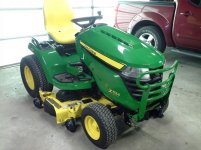tomd999
Platinum Member
Hiya,
Yet another oil thread that ends up with people getting cranky. :mur:
What is really the factor for longevity is changing whatever oil you use more often than the manual says to. Keep in mind that these small air cooled engines operate in a very hostile environment, the best thing you can do is change the oil to get rid of the microscopic dirt that is suspended in the oil. Don't fool yourself, the tiny oil filters on these don't catch and hold the small, less than 20 micron sized abrasives that cause wear and damage. To have really clean oil, you need supplemental by-pass filtration, down to less than 1 micron, something impractical on these sized machines. If your engine doesn't have a filter, change the oil more often.
Use the weight or grade your manual states for the temps you are expecting to see during the time you plan to have that oil in the engine. Change it more often than the severe service timeline says to and don't forget to clean around the fill cap before you put oil in. Do that, keep the cooling fins clean and clear of chafe and debris, only run your equipment at maximum throttle when you really need to and it will last for years.
Here's an example, 30+ years ago I worked for a school department. During the summer, 4 of us had to cut lawns at 31 schools. 5 days a week for 12 weeks we cut acres of grass with 21" Bobcat push mowers. We got 4 brand new mowers with 4 HP B&S engines. At the end of mowing every day, I would walk my mower over to the fuel oil tank fill, dump the oil out then fill it with fresh 30wt (The schools used #4 bunker so 12Oz of engine oil wouldn't make a difference in 4000 gallons) At the end of the summer my mower was the only one that ran well, 2 had rod failures, the 3rd ran but smoked and mine ran well.
My 2 cents,
Tom
Yet another oil thread that ends up with people getting cranky. :mur:
What is really the factor for longevity is changing whatever oil you use more often than the manual says to. Keep in mind that these small air cooled engines operate in a very hostile environment, the best thing you can do is change the oil to get rid of the microscopic dirt that is suspended in the oil. Don't fool yourself, the tiny oil filters on these don't catch and hold the small, less than 20 micron sized abrasives that cause wear and damage. To have really clean oil, you need supplemental by-pass filtration, down to less than 1 micron, something impractical on these sized machines. If your engine doesn't have a filter, change the oil more often.
Use the weight or grade your manual states for the temps you are expecting to see during the time you plan to have that oil in the engine. Change it more often than the severe service timeline says to and don't forget to clean around the fill cap before you put oil in. Do that, keep the cooling fins clean and clear of chafe and debris, only run your equipment at maximum throttle when you really need to and it will last for years.
Here's an example, 30+ years ago I worked for a school department. During the summer, 4 of us had to cut lawns at 31 schools. 5 days a week for 12 weeks we cut acres of grass with 21" Bobcat push mowers. We got 4 brand new mowers with 4 HP B&S engines. At the end of mowing every day, I would walk my mower over to the fuel oil tank fill, dump the oil out then fill it with fresh 30wt (The schools used #4 bunker so 12Oz of engine oil wouldn't make a difference in 4000 gallons) At the end of the summer my mower was the only one that ran well, 2 had rod failures, the 3rd ran but smoked and mine ran well.
My 2 cents,
Tom
